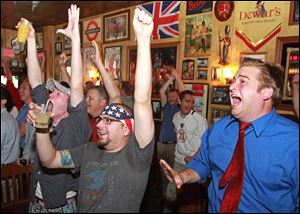
Donovan's late-game heroics ignite celebrations across U.S.
6/24/2010
Soccer fans in the Royal Mile bar in Des Moines celebrate after Landon Donovan's goal sent the U.S. into the second round.
They might not all have known who Landon Donovan was before Wednesday, but that didn't stop fans across the nation from celebrating one of the biggest victories in U.S. soccer history.
Donovan's decisive goal at the World Cup in South Africa united die-hard soccer supporters and casual observers, leaving both shouting, singing, and sobbing tears of joy in bars, restaurants, and office cubicles from coast to coast.
One of them, Carl Witkowski, declared that he has cried only three times in his life.
"When I got married, when I saw my son was born," said Witkowski, who wore his blue No. 17 Jozy Altidore jersey to watch the match at the Highbury Pub in Milwaukee. "And today."
The 1-0 victory over Algeria saved the Americans from elimination and sent them into the second round for a game Saturday against Ghana. Walter Bahr, who played on the 1950 World Cup team that beat England 1-0, is already looking forward to that game after watching Donovan's heroics on TV at his home in Boalsburg, Pa.
"I thought it was one of those games where they couldn't buy a goal," Bahr said. "They certainly had enough opportunities - a little here and a little there - and they just couldn't put it in the net."
Then Donovan finally rifled a rebound into the back of the net in stoppage time.
It led to an explosion of joy at places like the Highbury, a soccer-themed bar in Milwaukee's Bay View neighborhood.
"If you imagine an atom bomb dropping, imagine 30 of them going off at once in the 100-foot radius," said Alan Bykowski, who was waiting outside the door when the bar opened at 5:30 a.m. "Except they're atom bombs of joy!"
Bobby Poursanidis, the director of the Fort Wayne (Ind.) Fever soccer club academy and a consultant to a soccer school run by Fort Wayne native and U.S. player DaMarcus Beasley, watched the game at J K O'Donnell's bar.
"It was absolutely awesome," Poursanidis said. "You could see the anticipation of everybody, but as soon as the goal was scored, you could hardly hear yourself."
Not everybody who wanted to watch was able to skip work, of course, leading to lost production akin to what happens in the U.S. during the NCAA men's basketball tournament each March.
Jayme Joers, a clerical assistant at a law firm in Cincinnati, had to make due with an Internet feed at her desk.
"I tried really hard to be quiet," she said. "But as the game progressed, I couldn't."
On a scale of 1 to 10, how excited is she about the win?
"I'm like a '12,'•" she said. "All I want to do is just run around and celebrate."
It was a galvanizing moment for U.S. soccer, one that could help the game elbow its way further into the American sports mainstream.
An hour after the big win, Highbury patrons were embracing, singing, and dancing on the bar. James Brown's "Living in America" was blasting on the sound system.
"I have hugged and kissed more men and women today than I have in my entire life," Bykowski said.
Witkowski, a correctional officer for the state of Wisconsin, called the U.S. team a bunch of "blue-collar schlubs" - and meant it as a term of affection.
"They're not the most talented team out there," Witkowski said. "But they give their all."